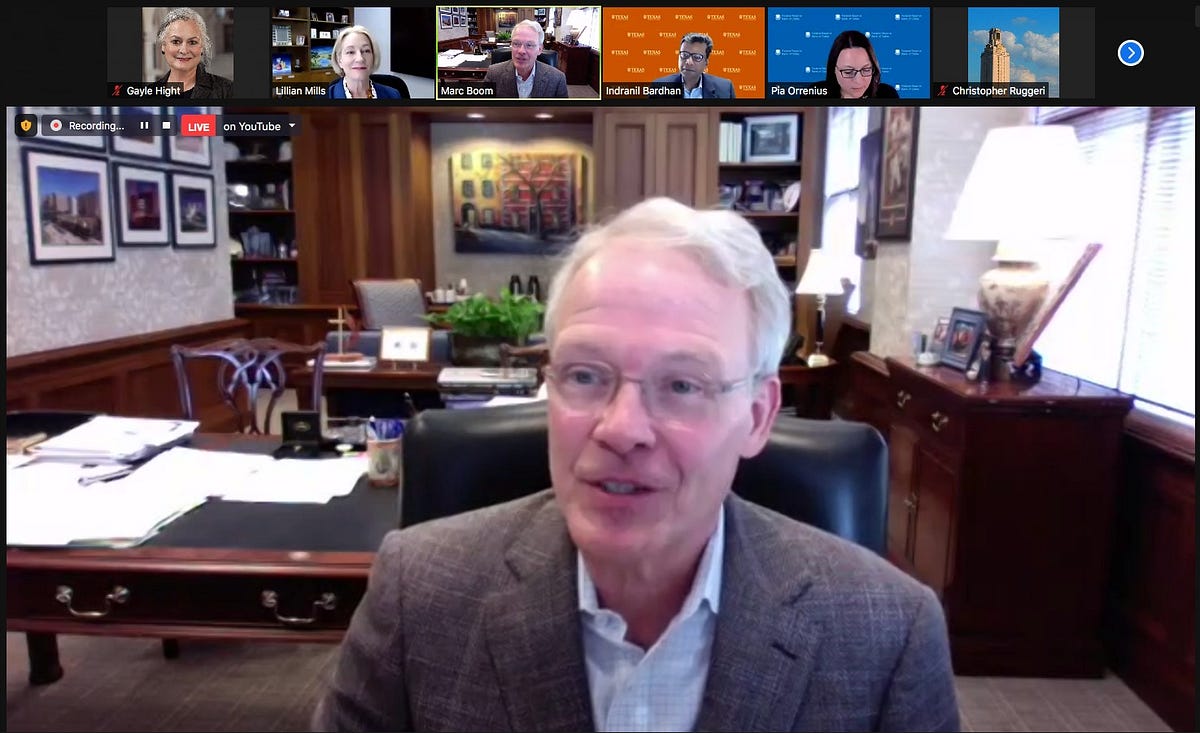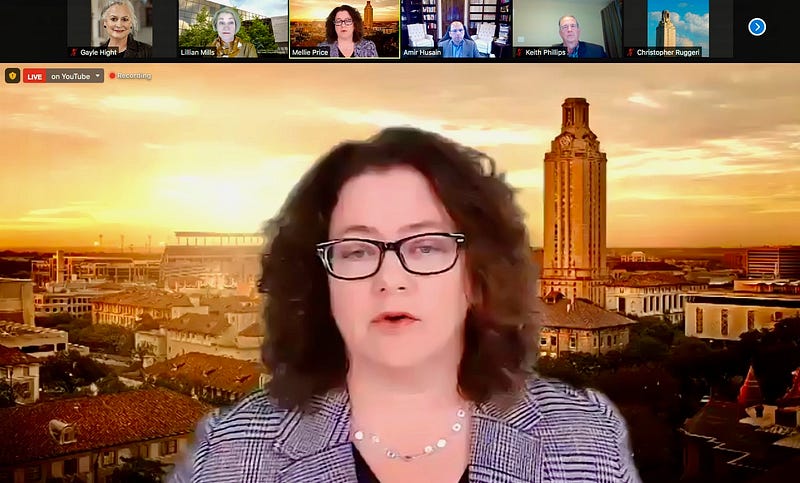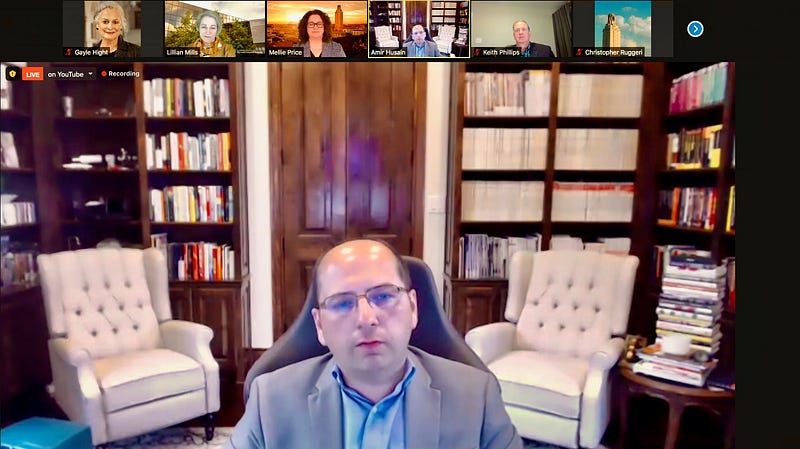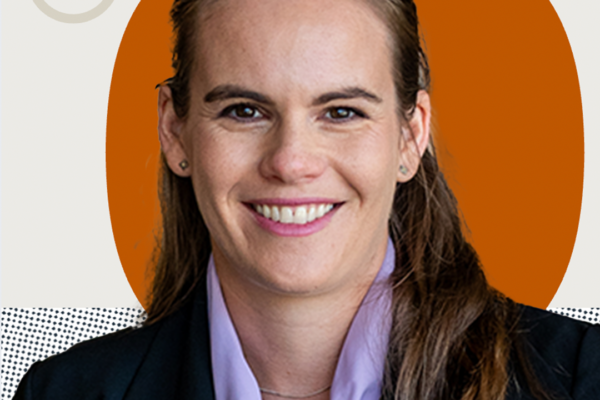Nursing Texas back to economic health
Experts at a pair of McCombs Business Forecast events offer prescriptions and prognoses for Texas’ ailing economy
By Judie Kinonen

The coronavirus vaccine is a shot in the arm for Texas’ economy, but a full recovery from the pandemic-induced recession may be a long way off, according to panelists at the annual Texas McCombs Business Outlook Series in February. The two virtual events, entitled “Focus on the Future,” featured top business leaders and economists, who highlighted healthcare and technology as paths back to economic vigor, and were hosted by Texas McCombs Interim Dean Lillian Mills.
The Healthcare event, held on Feb. 4, featured Dr. Marc L. Boom, president and CEO of Houston Methodist; Pia Orrenius, vice president and senior economist, Federal Reserve Bank of Dallas; and Indranil Bardhan, professor of information systems, McCombs School of Business. The Technology/Innovation event on Feb. 11 featured Amir Husain, founder and CEO of SparkCognition; Mellie Price, executive director, Jon Brumley Texas Venture Labs at Texas McCombs; and Keith R. Phillips, assistant vice president and senior economist, Federal Reserve Bank of Dallas, San Antonio Branch.
The Federal Reserve Bank of Dallas has forecast a whopping 4% job growth this year, yet it may be the summer of 2022 before employment is back on track, said Pia Orrenius, assistant vice president and senior economist at the Dallas Fed.
Texas’ oil and gas sector lost a quarter of its jobs last year, and the state lost 11% of its total workforce — more than 1.4 million jobs, Orrenius said. A year later only about half those jobs have returned: “The recovery has been slower than we hoped,” she said.
Hospitality and leisure are especially sluggish, as a Dallas Fed survey of businesses revealed only 7% in that sector expect to return to 2019 levels this year, 32% by next year, and 71% by 2023, said the Fed’s Keith Phillips, assistant vice president and senior economist.
By contrast, residential construction has surged, and Texas enjoyed a 6% increase in the homeownership rate last year. “That’s just unprecedented,” Orrenius said. “So, it’s a little bit a tale of two cities with regard to the pandemic’s sectorial impact.”
Rx: Technology adoption
One positive effect across sectors is an openness to new technologies, said Phillips, citing a January survey that found 28% of businesses increased technology adoption in the past year.
That trend leaves room for artificial intelligence to “work out of the box,” said Amir Husain, founder and CEO of SparkCognition. According to Husain, AI sophistication and adoption will only expand moving forward. “It’s going to take the form of an intelligent fabric that wraps around infrastructure; pumps, turbines, oil rigs, solar farms and so much more.” he said. “AI that can control physical systems in the real world is about to get real and it’s going to have massive impact.”

Protecting companies from the risks inherent in technology adoption is the cybersecurity industry, which has grown at an average annual rate of 8.2% since 1990, Phillips said. Even last year, while overall job growth declined 4.5% in Texas, cybersecurity grew by 6.7%, he said.
Monitoring healthcare
Healthcare is growing, albeit more slowly, after last spring’s “absolutely brutal” shut-down of non-elective services, said Marc Boom, president and CEO of Houston Methodist.
Hospital spending dropped about 36% in March and April of 2020 alone, and hospital care and related services were down about 3.6% for the first 10 months of 2020, explained Indranil Bardhan, Texas McCombs professor of information, risk, and operations management.
Bucking that trend is home healthcare, which grew about 14% last year and may exceed that rate this year, driven by investments in telehealth and remote patient monitoring, Bardhan said.
But access is a pressing issue, Boom said, noting 18% of Texans are uninsured — double the national rate — even as the state chose not to expand Medicaid. “If [President] Biden’s serious about unity and bipartisanship, I think that administration working with the Texas administration really needs to ask how we close these gaps,” he said.

A dose of new jobs
The new administration would also do well to focus on full employment, said Mellie Price, co-founder of Capital Factory and executive director of McCombs’ Jon Brumley Texas Venture Labs.
Price is excited about the influx of venture capital and corporate headquarters to Austin and what it means for workforce diversification. “Keeping employment high allows us to stimulate innovation and keep that flywheel in motion,” she says.
Watch the full video here for “Focus on the Future: Healthcare.”
Watch the full video here for “Focus on the Future: Technology/Innovation.”
About this Post
Share:


